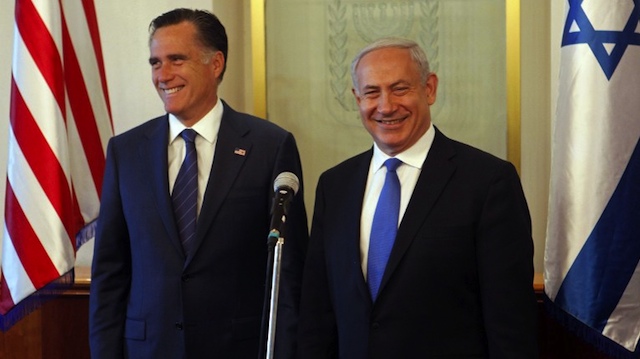SUMMARY
This is AI generated summarization, which may have errors. For context, always refer to the full article.

JERUSALEM – Israel was bracing on Thursday, November 8 for chillier ties with Washington, with pundits unanimous that a re-elected President Barack Obama will seek payback for Benjamin Netanyahu’s supporting Mitt Romney.
“Netanyahu gambled, we will pay,” said a headline in top-selling daily Yediot Aharonot, referring to the Israeli prime minister’s ill-concealed backing for Obama’s Republican challenger in this year’s election.
“On the losing side,” read another headline in the same paper.
And a cartoon showed Romney picking up a phone and turning to his wife as she dismantles his campaign headquarters, saying: “Poor Bibi, I’m going to give him a call to offer my condolences.”
Tensions between the two leaders surfaced during Obama’s first term.
Their public meetings were characterised by a clear lack of chemistry, and differences over such key issues as the peace process and how to handle the Iranian nuclear threat sometimes spilled over into high-profile public dispute.
“Obama now has four years to settle accounts with Netanyahu, for his open support of Mitt Romney, for degrading him before Congress, for freezing negotiations with the Palestinians, for the settlements and for his attempts to teach him leadership lessons on the Iranian issue,” said the left-leaning Haaretz newspaper.
But it was Netanyahu’s backing for Romney that appeared to rattle the Obama administration most and was likely to see the president seeking to “settle scores” with the Israeli premier, the Maariv newspaper said.
“That score is going to be a personal score over what is perceived by the White House as Netanyahu’s gross meddling in the American presidential elections,” wrote commentator Eli Bardenstein.
“Netanyahu is worried. Very worried.”
The crisis of confidence between the two leaders had created “huge fears in Jerusalem about what lies in store,” he wrote.
“If he takes revenge on Bibi or even just conducts himself with chilly cerebral rationalism, we’re going to be in a difficult position,” an official from Netanyahu’s inner circle told Maariv.
While most commentators agreed Obama’s response was likely to be “a cold shoulder,” a shift in the relationship could spell a headache for Netanyahu, who is in the middle of his own campaign ahead of a January election.
The first litmus test for US intentions towards Israel is likely to be played out in the coming weeks, as Palestinian president Mahmud Abbas seeks upgraded membership at the United Nations — a move Israel and Washington oppose.
Last year, a high-profile Palestinian attempt to seek full state membership was thwarted at the Security Council by US threats of a veto. This year, a veto is out of the question as the bid will be put to a vote in the UN General Assembly.
“It is one question whether Obama will invest any of his political capital to stop them. It is another question altogether if Obama decides to let them do it. Imagine how much Netanyahu is going to like that,” Bardenstein wrote.
“Netanyahu won’t be able to avoid making difficult decisions and paying a high political price against the backdrop of American demands. He might find himself put to the test sooner than expected, now that he has learned that Obama, and not Romney, will be seated in the Oval Office.”
The other key issue of immediate concern for both Obama and Netanyahu is the fresh round of talks between Iran and six world powers that is to take place by the end of the year.
“Obama will not forget and will not forgive Netanyahu for his support of Mitt Romney,” wrote Haaretz diplomatic correspondent Barak Ravid.
“However, one hopes that Netanyahu and Obama manage to put aside the bad blood between them and work together to address these two challenges. Netanyahu must do everything in his power to help Obama help him.” – Agence France-Presse
Add a comment
How does this make you feel?
There are no comments yet. Add your comment to start the conversation.